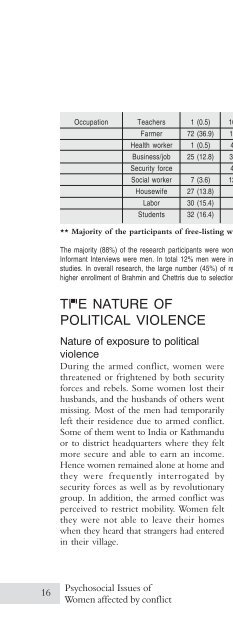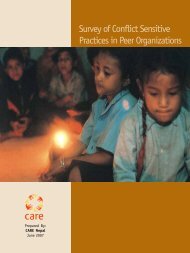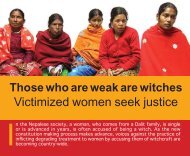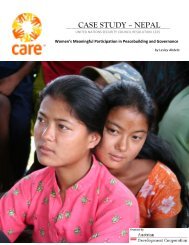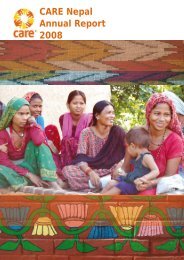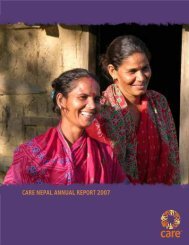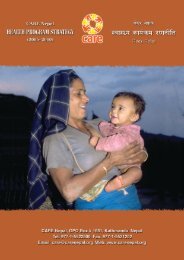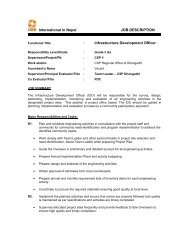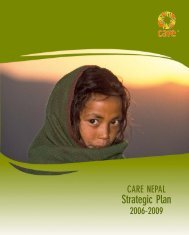Untitled - Care Nepal
Untitled - Care Nepal
Untitled - Care Nepal
Create successful ePaper yourself
Turn your PDF publications into a flip-book with our unique Google optimized e-Paper software.
Occupation<br />
Teachers<br />
Farmer<br />
Health worker<br />
Business/job<br />
Security force<br />
Social worker<br />
Housewife<br />
Labor<br />
Students<br />
1 (0.5)<br />
72 (36.9)<br />
1 (0.5)<br />
25 (12.8)<br />
7 (3.6)<br />
27 (13.8)<br />
30 (15.4)<br />
32 (16.4)<br />
16 (40)<br />
1 (2.5)<br />
4 (10)<br />
3 (7.5)<br />
4 (10)<br />
12 (30)<br />
33 (61.1)<br />
9 (16.7)<br />
12 (22.2)<br />
6 (75)<br />
2 (25)<br />
17 (5.7)<br />
112 (37.7)<br />
5 (1.7)<br />
39 (13.1)<br />
4 (1.3)<br />
19 (6.4)<br />
27 (9.1)<br />
42 (14.1)<br />
32 (10.8)<br />
** Majority of the participants of free-listing were illiterate.<br />
The majority (88%) of the research participants were women although one third of the research participants in Key<br />
Informant Interviews were men. In total 12% men were interviewed and none of them were in free-listing and case<br />
studies. In overall research, the large number (45%) of respondent belonged to Janajati but in KII alone there was<br />
higher enrollment of Brahmin and Chettris due to selection criteria.<br />
THE NATURE OF<br />
POLITICAL VIOLENCE<br />
Nature of exposure to political<br />
violence<br />
During the armed conflict, women were<br />
threatened or frightened by both security<br />
forces and rebels. Some women lost their<br />
husbands, and the husbands of others went<br />
missing. Most of the men had temporarily<br />
left their residence due to armed conflict.<br />
Some of them went to India or Kathmandu<br />
or to district headquarters where they felt<br />
more secure and able to earn an income.<br />
Hence women remained alone at home and<br />
they were frequently interrogated by<br />
security forces as well as by revolutionary<br />
group. In addition, the armed conflict was<br />
perceived to restrict mobility. Women felt<br />
they were not able to leave their homes<br />
when they heard that strangers had entered<br />
in their village.<br />
“Women are interrogated using abusive words<br />
and such words were mostly used<br />
by army soldiers”.<br />
“As women used to be alone at home, they<br />
had feared that the opponent party would<br />
come and rape them”.<br />
(A woman aged 38, married, literate,<br />
business, b/c from Makawanpur)<br />
Women reported that the pressure for doing<br />
additional household chores increased due<br />
to the armed conflict. Since men were away<br />
from home or some of them were involved<br />
in the conflict directly, the entire work of<br />
the house, family and farm had to be managed<br />
by women alone due to which they felt<br />
worried about how to manage everything.<br />
“There is worry that war will continue. Men won’t stay<br />
at home; women will have to do all the works”.<br />
(A woman aged 36, married, janajati, literate,<br />
agriculture from Makawanpur)<br />
16<br />
Psychosocial Issues of<br />
Women affected by conflict


